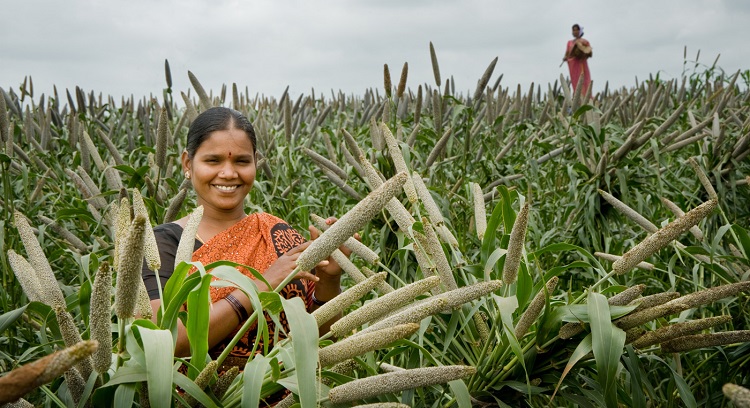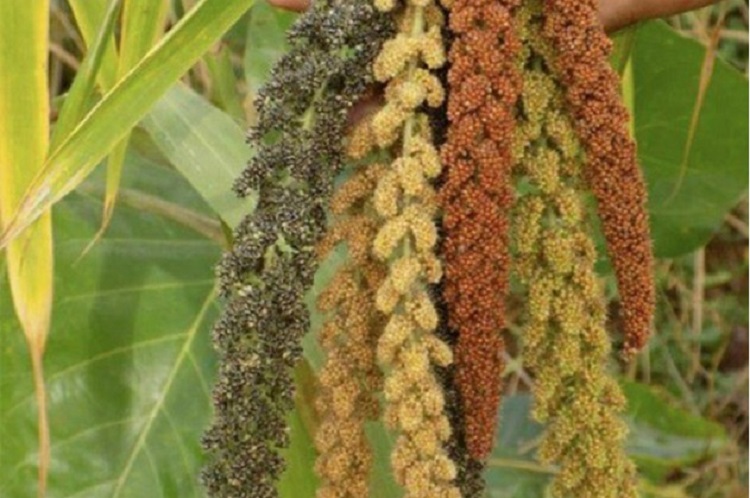NRI is heading up a new project which is working with women millet producers in Self-Help Groups (SHGs) in Odisha, India, and which has just been awarded a prestigious grant of one million dollars over the next three years. The funding, from the International Initiative for Impact Evaluation (3ie) and the Bill & Melinda Gates Foundation, will enable the project to evaluate in detail, whether and how millet processing and value addition provide income and enhance livelihoods for women in the groups.
The project is led by NRI’s Dr Apurba Shee, who is also exploring the extent to which working with collective millet-based enterprises can contribute to women having greater control over income and support their empowerment. Along with NRI, the project team includes Watershed Support Services and Activities Network (WASSAN), Nabakrushna Choudhury Centre for Development Studies (NCDS), Brunel University London, and University of Kent.
with NRI, the project team includes Watershed Support Services and Activities Network (WASSAN), Nabakrushna Choudhury Centre for Development Studies (NCDS), Brunel University London, and University of Kent.
In India, engaging women SHGs in livelihood programmes is a strategy already widely used by governmental and non-governmental organizations (NGOs). However, these programmes and projects have typically not been implemented in such a way as to facilitate a rigorous evaluation of their impacts. As Apurba Shee points out, “given the societal and developmental importance of these livelihood initiatives, and the significant public investments to support them, this knowledge gap is of great importance and this research aims to fill the gap, and provide some of the first rigorous evidence on the impact of a specific livelihood intervention.”
Millet is a highly nutritious grain, full of protein, energy, vitamins and minerals and more importantly, it’s hardy and drought-tolerant. Historically, women have been responsible for the majority of millet processing in India, but as Dr Shee explains, the problem lies in the fact that there is a huge amount of sheer drudgery involved in the processing of millet. He says; “availability of appropriate equipment is limited in some parts of rural India so postharvest processing has to be done manually and on open floors, and as a result the hand-processed millet is often of poor quality and contaminated – this affects the sale price.”
“The dust and husk particles are also a problem; they are hazardous and make women prone to respiratory problems. If women can get affordable access to labour-saving, drudgery-reducing technology in the postharvest stage - like threshers, graders, destoners, dehullers, and personal protective equipment – and have management control over its use, their workload could be reduced. The aim of our project is to promote millet enterprises through supporting women SHGs for millet processing and value addition activities. The processing will be facilitated through the provision of labour-saving and women friendly tools and equipment, and technical support, and the value addition will be provided primarily through new product development.”
An important barrier to entrepreneurship for women in millet processing and value addition relates to the specific local social norms which influence women’s autonomy and decision making and their ability to engage in enterprise and trade. Dr Shee explains that in some areas of India, women have a lot of social restrictions placed upon them; for example they cannot, as individuals, deal directly with traders or businesses, as culturally it is seen as the ‘man’s job’. He says, “social norms can restrict women’s participation in microenterprises.”
Furthermore, women’s work choices are influenced by other socio-cultural constraints: their level of responsibility for household tasks, lack of support for childcare, and lesser access to training, advice, financial services and other resources.
However, Dr Shee says that things change when women are in a group situation, allowing them to access opportunities despite social constraints. He explains: “for many years, the Government of India’s flagship program, National Rural Livelihoods Mission (NRLM) has been promoting SHGs which are a village-based collective of 10-20 women who meet every week, pool their regular savings to create a common fund, and discuss social issues. They have each other to bounce ideas off and to share problems, they are no longer isolated within the home. It’s collective social capital.”
 “Women’s participation in SHGs can help them overcome the social constraints to women’s economic activities, while group management of finances can assist women to retain control of income from such activities. That’s why our approach is to promote millet enterprise through SHGs instead of individual women. This can lead to greater empowerment of women in terms of confidence and ability to determine their own choices, although this outcome is also influenced by dynamics outside group control, such as decision-making power within the household. “
“Women’s participation in SHGs can help them overcome the social constraints to women’s economic activities, while group management of finances can assist women to retain control of income from such activities. That’s why our approach is to promote millet enterprise through SHGs instead of individual women. This can lead to greater empowerment of women in terms of confidence and ability to determine their own choices, although this outcome is also influenced by dynamics outside group control, such as decision-making power within the household. “
This project won the million-dollar funding by entering a global competition run by 3ie’s Swashakt evidence programme which supports collectives and group-based models for women-led businesses and evaluations that assess the feasibility and effectiveness of these projects. $600,000 will be spent on implementing the various millet processing and value addition schemes where women in the SHGs will receive training on how to use the equipment for processing and value addition, along with enterprise development, nutritional information and marketing support.
$400,000 will fund a thorough impact evaluation of how the provision of services through SHGs, related to millet processing and value addition, affects entrepreneurial activities (e.g. business investments and income generation), women’s decision making authority within the household and household welfare (e.g. nutrition, health, and education of children). The evaluation will also explore the effects of the project on women, differentiated by age, wealth, education or other factors.
The project will operate as a cluster randomized control trial (RCT) by categorising women’s SHGs into three groups of established SHGs that have existed for more than three years. Group 1 will receive services related to millet processing, group 2 will receive services related to millet processing and value addition, and group 3, the ‘control’ group, will receive no immediate support, but will be part of a planned sequenced roll out.
At the end of the research period Dr Shee and his team will compare the results of the three different groups to determine what is the effect of promoting millet processing and what is the extra benefit of value addition”. He concludes, “our research will help building the strategy for scaling up successful millet enterprises in women’s collectives”.
To find out more about:
NRI Food and Markets Department
International Initiative for Impact Evaluation (3ie)
The Bill & Melinda Gates Foundation
Watershed Support Services and Activities Network (WASSAN)

